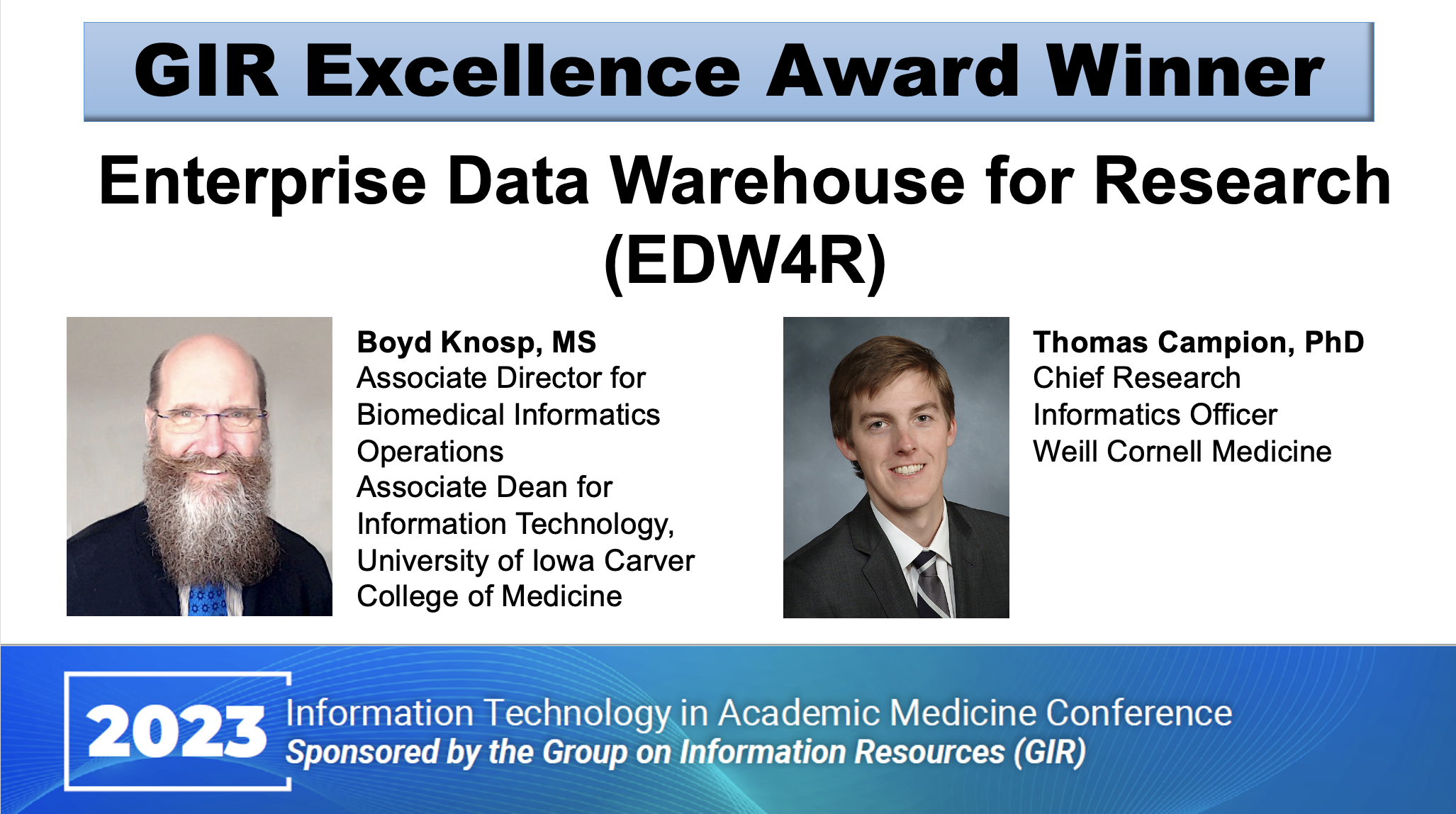
Dr. Thomas Campion, chief research informatics officer and associate professor of population health sciences and healthcare policy research in pediatrics at Weill Cornell Medicine (WCM), recently received the Association of American Medical Colleges (AAMC) 2023 Group on Information Resources (GIR) Excellence Award alongside Boyd Knosp, associate director for biomedical informatics operations and associate dean for information technology at the University of Iowa Carver College of Medicine, for their work on the Enterprise Data Warehouse for Research (EDW4R).
The GIR Excellence Award is given to individuals who have contributed significant work in an academic medical information technology domain, supporting clinical, educational, or research mission areas. The award recognizes work with national and international impact that other institutions may follow.
Dr. Campion began working with Knosp through the Clinical and Translational Science Awards (CTSA) Program, of which the Weill Cornell Clinical & Translational Science Center is part. The CTSA program, which is funded by the National Institute of Health’s National Center for Advancing Translational Sciences (NCATS), supports a national network of medical research institutions, or hubs. These hubs collaborate extensively to improve the translational research process.
“[Knosp and I] came together and explained to CTSA national leadership that the ability to collect, transform, and deliver electronic patient data to investigators was not widely understood. However, it was increasingly of value at every academic medical center,” said Dr. Campion. “The CTSA steering committee approved a proposal for us to form a working group focused on EDW4R.”
EDW4R are informatics resources that provide researchers with patient data to inform scientific studies and decision-making. Dr. Campion explains that although electronic health records (EHRs) are ubiquitous in the US, most of the data collected for those records are intended for clinical care and administrative billing. As such, the data are not designed to support research.
His and Knosp’s research is largely focused on better understanding how various institutions use EDW4R and improving that use to make the data better accessible to researchers. Their previous articles in the Journal of the American Medical Informatics Association from 2020, 2021, and 2022, detail how CTSA hubs have operationalized EDW4R services, assess EDW4R operations in academic medical centers, and identify best practices for EDW4R use. In a 2023 article in the Journal of Clinical and Translational Science, they establish a maturity index that measures EDW4R functions across fifteen CTSA hubs.
With each study, they aim to reach a number of audiences: the people that already work with EDW4R on a practical or operational level, the leaders of medical schools and research enterprises, and the chief information officers of those institutions. Dr. Campion explains that the challenges to using EDW4R are equally about technology as they are the workforce.
“It is such a new set of skills that we need, and it’s not just from technologists or statisticians; we need people who can thoughtfully interrogate clinical data and work alongside clinicians and statisticians to help guide them,” said Dr. Campion. “Finding people with these skills is exceptionally rare, and developing these skills in faculty and staff is critical to the biomedical research enterprise.”
Dr. Campion also emphasizes that there have been issues with documenting “basic information,” such as race and ethnicity in data. As such, he wants to ensure that the teams studying and working on EDW4R are diverse and inclusive to account for the diverse patient population, especially in NYC. From a technological standpoint, he recognizes the challenge of training people to use entirely new platforms amidst their own day-to-day work. Additionally, because the EDW4R function has evolved differently at every academic medical center, the approach to that functionality varies.
“We find that this [EDW4R] is incredibly valuable as an enterprise service or utility. You expect certain things just to work: your phone calls and texts will go through, your cable TV will turn on; these are utilities, a taken-for-granted thing,” he explained. “We’re now starting to approach research IT, research informatics, and the EDW4R function as a utility.”
Dr. Campion is appreciative of the support he’s received from several leaders at WCM, including Dr. Rainu Kaushal, senior associate dean for clinical research and chair of the Department of Population Health Sciences, and Dr. Jyotishman Pathak, chief of the Division of Health Informatics and Frances and John L. Loeb Professor of Medical Informatics. He also extends gratitude to Dr. Curtis Cole, vice president and chief global information officer of Cornell University, and Vipin Kamath, chief information officer.
As he moves forward with EDW4R research, Dr. Campion aims to continue supporting investigators through improved technology, workforce, and regulatory processes. He notes that investigators are currently using artificial intelligence to create various models based on the data available and is excited to see those implemented in clinical care. A new paper on EDW4R is currently in the works, and he expects his team and their efforts to continue to grow.
“It’s an area of ongoing scientific inquiry,” he said, “because we don’t yet know the best way of doing this. We’re seeing what works and other sites can seek to emulate those methods—just as we’ve stood on the shoulders of giants from other institutions and implemented a variety of their methods.”
- Highlights

